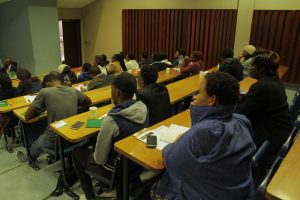The Maun workshop targeted those in the tourism business. Specifically, nature-based tourism operators, as they are most affected by drought. The workshop was themed ‘Loss and Damage: Increasing Environmental Awareness, Fostering Climate Resilience Among Nature-Based Tourism Operators’. It took place in Maun on July 7, 2023.
Project motivation
Drought is a recurring natural phenomenon that significantly impacts various sectors of the economy, including tourism. Tourism operators, particularly those dependent on natural attractions like water-based activities and wildlife safaris, are vulnerable to the adverse effects of drought. The project thus explored the impacts of drought on tourism operators and developed, and shared strategies to mitigate these effects, ensuring the resilience and sustainability of the tourism industry.
The project focussed on the following areas
- Assessed specific impacts of drought on tourism operators, including changes in tourist behaviour, revenue loss, and operational challenges.
- Identified adaptation strategies employed by tourism operators in drought-affected regions to maintain business continuity and minimize economic losses.
- Developed proactive measures and resilience-building initiatives to help tourism operators mitigate the effects of drought and enhance their adaptive capacity.
- Raised awareness among tourism stakeholders about the importance of drought preparedness and sustainable water management practices to safeguard the long-term viability of the tourism industry.
Other project action were - Data Collection: Conducted surveys, interviews, and focus group discussions with tourism operators in the greater Maun area to gather insights into the specific impacts of drought on their businesses and the adaptation strategies they employ.
- Case Study: Analysed their feedback and published a case study showcasing the non-economic loss and damage impacts experienced, and highlighting coping measures adopted.
- Stakeholder Engagement: Collaborate with government agencies, tourism associations, environmental organizations, and local communities to facilitate knowledge-sharing, capacity-building, and collective action towards drought resilience in the tourism sector.
- Expert Consultation: we sought input from experts (workshop speakers) in fields such as water management, climate resilience, and sustainable tourism to inform the development of effective mitigation strategies tailored to the needs of tourism operators.
Project impact on participants - They gained a comprehensive understanding of the impacts of drought on their tourism activities.
- They were equipped with practical, cost-effective adaptation measures and resilience-building strategies to help them minimize the economic impacts of drought.
- They were provided with actionable recommendations and best practices for drought preparedness and resilience.
- Increased awareness and capacity, to integrate drought resilience into business operations and destination management practices, ultimately enhancing the long-term sustainability of the tourism industry.
Conclusion
By addressing the impacts of drought on tourism operators and sharing proactive mitigation measures, this project aims to strengthen the resilience of the tourism industry, protect livelihoods, and ensure the continued enjoyment of natural attractions for visitors. Through collaborative efforts and informed decision-making, we can build a more resilient and sustainable tourism sector that thrives even in the face of environmental challenges like climate change worsened drought.


